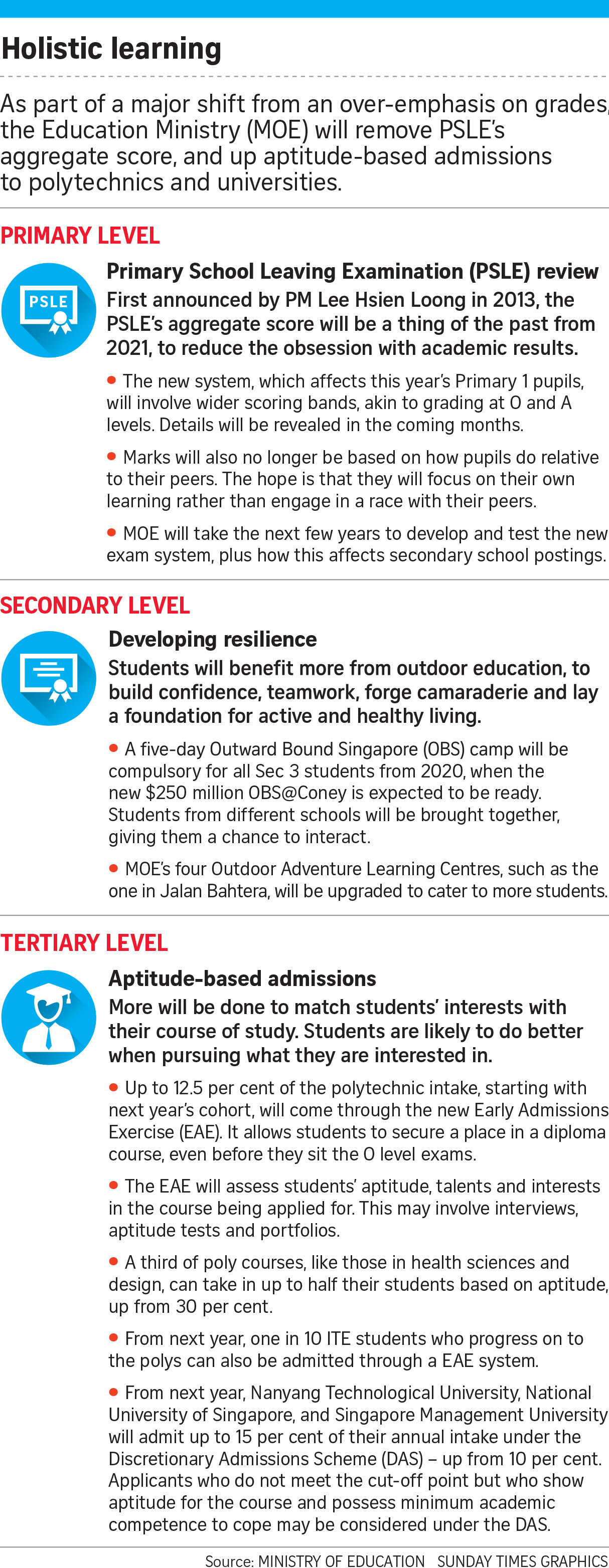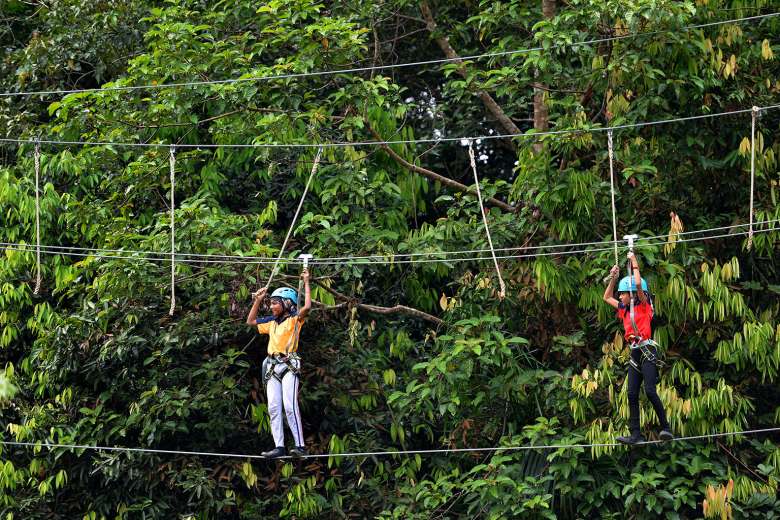Pupils in Primary 1 this year will be the first cohort to take the Primary School Leaving Examination (PSLE) and receive a new set of results.
In 2021, the national examination will do away with the aggregate score – often criticised for being the cause of excessive stress among pupils and parents. With the change, children will no longer be graded relative to one another.
In its place will be wider scoring bands such as A, B, C and D – similar to the scoring system used in the O- and A-level examinations.
But this is only the most obvious change to what has been a steady overhaul of a pressure-cooker system which has had a strong focus on marks instead of a child’s holistic development.
Already, in the early stages of primary education, exams have become a thing of the past. Pupils are increasingly being encouraged to express themselves. Applied learning is in, along with the development of character and life skills.
At Primary Four or Five, pupils take part in a three-day cohort camp and learn to prepare simple meals, adapt to the outdoors, and build resilience and camaraderie.
In the coming years, primary school leavers will have more choice to go to secondary schools offering niche programmes in robotics, environmental issues, the arts and music, for instance, where they can develop their interests beyond the three “R”s – reading, writing and arithmetic.
As Acting Education Minister (Schools) Ng Chee Meng explained in Parliament earlier this month when he announced the changes: “Let’s help our children make good use of their time to branch out to explore other interests and passions and to pursue what they want to do in life.
“Let’s help them make good choices about their educational and career pathways based on their aptitudes and aspirations.
“Let’s help them to be ready for the future.”

CHANGING THE LANDSCAPE
Singapore’s education system has gained a reputation for being highly competitive and overly focused on grades and book smarts.
But this is changing, very deliberately, at every level – from primary schools to tertiary institutions.
Results for national exams, such as the PSLE and A levels, are released without the top scorers being highlighted any more.
While schools do still recognise their best performers – as a group instead of individually – they also celebrate the achievements of those who show improvement, overcome challenges such as a disability or illness, or excel in areas such as volunteer work and sports.
More schools now also include programmes to nurture interests beyond books, such as drama and dance. Manjusri Secondary School principal Low Chun Meng said: “With a better match of the child’s interest to the school’s programmes, the school will be able to develop the child better.”
Schemes to admit students based on their non-academic talents have been introduced. The Direct School Admission (DSA) scheme, which started in 2004, allows secondary schools to admit students based on not just grades but their sporting and artistic merits.
All five polytechnics and three of the local universities – Nanyang Technological University, Singapore Management University and NUS – will be expanding their aptitude-based admissions, allowing students who do not quite make the grade academically but show passion and interest to get into the course of their choice.
Educators said the shift in emphasis is to help arm students with life skills. Old-school rote learning and memorising have given way to applying textbook knowledge to real-world scenarios and more current content. Language lessons and assessment now place more weight on communication skills to help students converse in English and mother tongues more confidently.
MOE is also placing a stronger emphasis on outdoor education. Under a physical education syllabus introduced in 2014, 10 to 20 per cent of curriculum time in primary and secondary schools is set aside for outdoor education.
As part of a new National Outdoor Adventure Education Masterplan, all students from 2020 will also take part in three cohort camps during their school years, including a five-day Outward Bound Singapore camp for Secondary Three students.
PARENTS’ SUPPORT
But there is a big caveat as to whether such moves will allow students and pupils to “not just study the flowers, but also stop to smell the flowers, and wonder at their beauty”, as Minister Ng put it.
Will parents also change their mindsets?
Scoring well in the PSLE is a national obsession, to ensure entry into a good secondary school.
Some parents have taken extreme measures, from moving homes to enter primary schools which supposedly produce top PSLE performers regularly, to sending children for Gifted Education Programme training and enrichment classes from a young age to help build DSA portfolios.
When MOE stopped releasing the list of top PSLE scorers, parents on websites such as Kiasuparents put together their own.
The shadow education industry, or tuition, is worth more than a billion dollars annually here, almost double the $650 million spent in 2004. Some parents spend several thousands of dollars on tuition for their children each month, on top of religiously buying past-year examination papers of various schools, especially the top ones.
Jalan Besar GRC MP Denise Phua, who heads the Government Parliamentary Committee for Education, said: “(Broader grade bands) will not take away the pressure completely as the underlying mindset – that academic achievement is all that matters, that students with higher grades have a higher chance to enter schools of their choice – will take a long time to change.”
Some parents, like housewife Lydia Tan who has a six-year-old son, pointed out that their generation was brought up with the idea that grades determine future success. The 38-year-old said: “Our parents and teachers would tell us to study hard, work our way into a university, and we would then get good jobs.”
Added National Institute of Education don Jason Tan: “Many parents still think the choice of school does matter. So for those vying for the top schools, it’s still about fighting for scarce places.”
THE NEED FOR CHANGE
Changes to the education system go beyond trying to reduce stress on children. They are a response to the needs of a rapidly changing world.
A report last year by the World Economic Forum titled New Vision of Education said that to thrive in today’s innovation-driven economy, employees need a different mix of skills than in the past.
“In addition to foundational skills like literacy and numeracy, they need competencies like collaboration, creativity and problem-solving, and character qualities like persistence, curiosity and initiative,” the report said.
“In countries around the world, economies run on creativity, innovation and collaboration. Skilled jobs are more and more centred on solving unstructured problems and effectively analysing information.”
As Mr Ng put it in his speech to Parliament during the debate on his ministry’s budget: “We want to cultivate a generation of young people who grow up with a sense of curiosity and a love for learning… asking both the ‘whys’ and the ‘why nots’.”
This ties in with the broader SkillsFuture initiative, which advocates mastery of skills over just collecting qualifications. Part of this involves getting students to explore their interests and passions from a young age. Said Acting Minister for Education (Higher Education and Skills) Ong Ye Kung: “It starts with schools, laying the foundation for our young.
“Then Higher Education – ITE, polytechnics, universities – takes over to help our young discover their interests and aspirations, impart knowledge in them, hone their skills and prepare them for the real world. From there, a lifelong learning system takes over, where they embark on a continuous journey of learning, updating or even finding a new path.
“Along the way, they will persevere, improve and achieve mastery in their chosen fields, and maybe teach the next generation.”
It is education not for the sake of grades, but for the joy of learning – a point that Singapore educators advocate.
Said Madam Sharma Poonam Kumari, principal of Changkat Changi Secondary School: “Education is moving beyond the transactional approach of sitting and clearing exams, to imbuing that love for learning. The future we are preparing children for is going to be very complex, and textbook knowledge will not always get them through.”
Qifa Primary School principal May Wong added that when students eventually apply for jobs, employers “are not going to look for the person with the highest aggregate score”. Instead, they value skills like teamwork and creativity, and traits such as resilience and empathy, she said.
Ms Phua believes there is room to go even further, suggesting that the PSLE could be done away with entirely. She said: “There may be a need to think out-of-the-box and try bolder models such as a 10-year or 12-year through-train model without the need for a high-stakes PSLE whilst retaining academic rigour, amongst other goals.”
Still, she firmly believes MOE is going in the right direction with the latest changes, although she cautioned: “The devil of course is in the detail.”

This article was first published on April 17, 2016.
Get a copy of The Straits Times or go to straitstimes.com for more stories.






